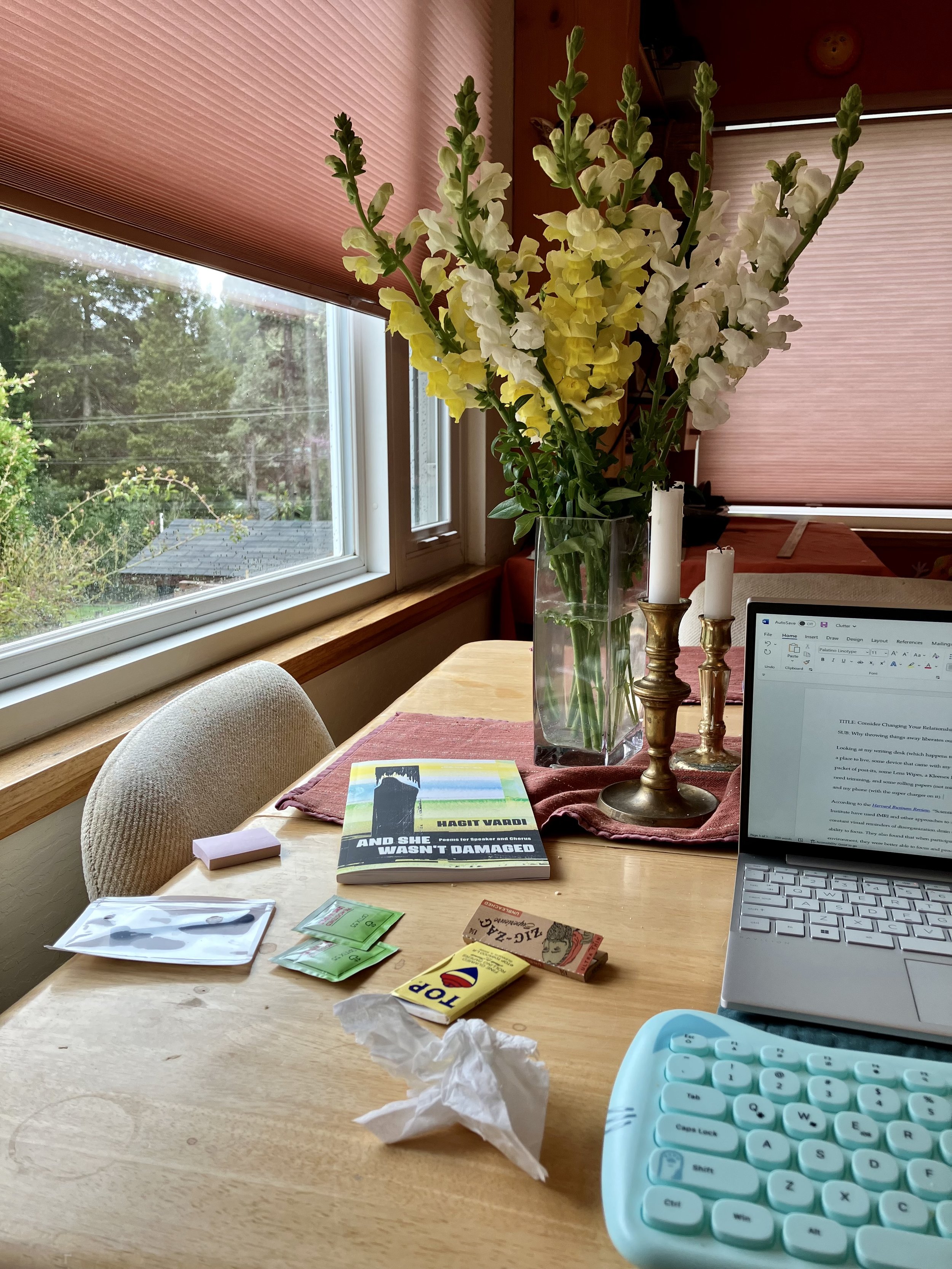Unlittering
Simplicity is the ultimate sophistication Leonardo Da Vinci
I love Before & After photos.
What you see above is my writing desk, AKA the kitchen table.
The scattering of objects includes: a poetry book in Hebrew and English, a tool for a phone charger, tiny post-its, Lens Wipes, a tissue I’m not quite done with, my beloved journal, and ZigZag papers (I was teaching someone the art of the roll), all on an uncleaned surface. I channeled an OCD Genie, in four minutes I reduced items to only those needed, clearing and cleaning… and presto-change-o! I feel much more writerly.
For years I have argued that “messy v. neat” is merely a style choice; that we are all wired differently. But I’m re-thinking… NOT. Remember Highlight’s magazine’s “Find the hidden objects,” where candlesticks were hidden in the bushes? They were onto something. We are, basically, simple minded, in the best sense of that term.
Andrew Fiouzi did the research: “Your messy desk is causing your work to take longer than it should, because your brain is too busy having a quiet little freak out to concentrate on the job at hand.” He cited an article in the Harvard Business Review: “Scientists at the Princeton University Neuroscience Institute have used fMRI and other approaches to show that our brains like order. Visual reminders of disorganization drain our cognitive resources and reduce the ability to focus.” They found that when participants dedicated the immediate work space to the task in mind, they were better able to focus and process information. Productivity increased because their focus wasn’t ping ponging between thinking that something should be tossed or dealt with, and what they were trying to accomplish. This is especially true for thoughtful and creative projects. Much yummier, I offer this tale from Thich Nhat Hanh:
“I left my hermitage with windows open to the morning breeze, my poetry and pen on the table. A storm arose before I returned. I found my home dark, cold, and rain coming inside. Papers scattered on the floor. First, I closed the window. Then I lit a candle. I started a fire. I gathered my papers back onto the table. I made tea. I began to write.”
Don’t you love the deliberate order of his actions? Any element of upset, or anger at himself was quickly calmed in reclaiming his creative space. Rooms in my house can look like the aftermath of a confetti parade, but the space where I want to focus into flow? Anything that doesn’t belong to the project is litter. Misplaced items distract, insisting “Do me!” when they aren’t a priority. I bet this is why making your bed immediately upon awakening has been touted as a step toward higher performance. Perhaps a bit more neuroscience to convince?
The brain is divided into sections that do battle more than they cooperate. The critical, even judgey, thinker is the Prefrontal Cortex, the “adult brain.” It guards against the uncertainty, even danger, of creative impulses, which harken from the chaotic cerebellum. It is this clunkier chunk that supports mindstorming.* It encourages original thought, allowing us to take risks. I learned all this from Charles Lamb, MD on a TED talk.
The shitty first draft (ty, Anne Lamott) is a terrifying invitation for failure and rejection. And those “reminders of disorganization” lend excuse to avoid the fear of not being perfect right out of the gate. I’m saying please don’t clean your kitchen before you invite Musey to your art party. This impulse is your PFC telling you to avoid the terror of imperfection. Of course, if you are trying to create a beautiful meal? Then, detail your kitchen as an invocation of the culinary Goddesses.
I’m undoubtedly not saying anything original to you. But the important construct for me? It’s already a challenge to justify time spent on innumerable iterations, whether keystrokes or brushstrokes. (I’ve rewritten this piece about fifteen times, no lie). This requires reassurance that there is nothing truly more demanding of immediate attention. If my eyes keep glitching on the litter screaming “What doesn’t belong in this picture!?” the struggle to maintain focus sucks up valuable energy. Make sense?
Your turn: Find a tiny corner that would love to hold paper, pen, brush, pencil, block of clay. Spend no more than five furious minutes tossing trash and moving objects out of your peripherals. Simplify just this small visual and physical field. Toss or stash all litter. Now, give yourself permission to clear a small realm, dedicated for the creation of the necessary, deliberate mess from which beauty and meaning are born.
*Mindstorming is like brainstorming with others, but done solo.
Click here to purchase my NEW guided visualization, Finding Your Perfect Summer Cabin.
Click here to purchase my book, The Courage to Trust.
Click here to purchase the audiobook of The Courage to Trust.
Click here to purchase my 90-minute guided visualization, Embracing True Prosperity.


